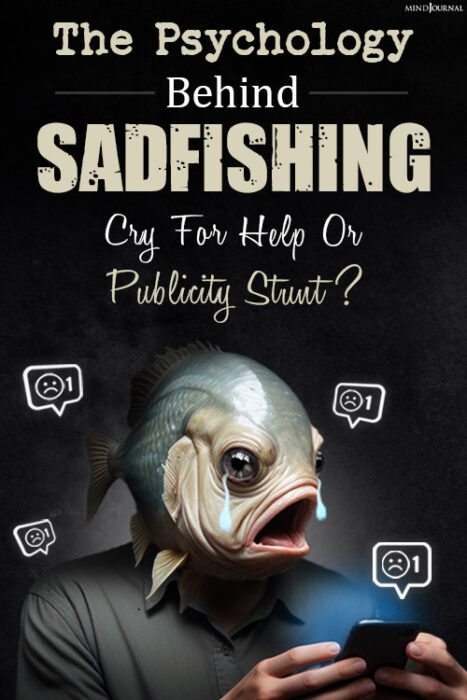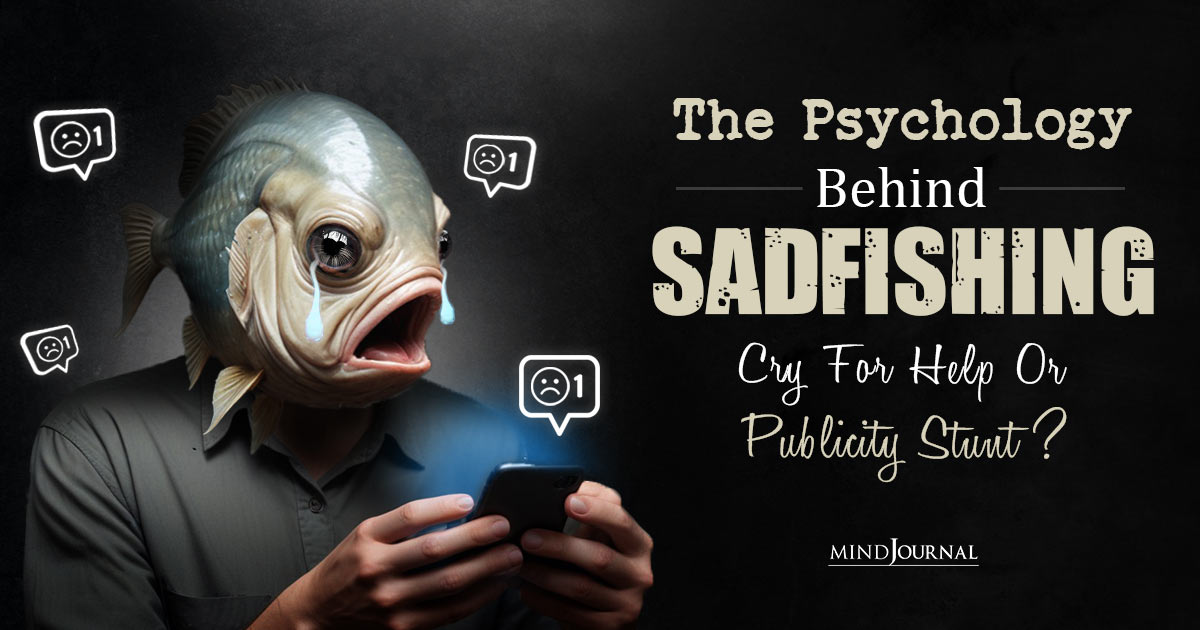Do you know someone who exaggerates their problems on social media? According to trends this behavior is called sadfishing.
Like catfishing where someone creates a fake persona or pretends to be someone else entirely on the internet; those who sadfish amplify their emotional troubles so that others may feel sorry for them or pay attention to them.
What is Sadfishing?

Depression, personality disorders and narcissism are among the many identified roots of sadfishing, according to studies. However, it is mostly done by those who struggle with loneliness and low self-esteem. They post on social media about feeling worthless and unloved. Their posts garner numerous comments expressing concern and support.
Related: Need For Attention: Why Are Narcissists Obsessed With Attention?
However, they often reject practical advice or solutions offered by their friends. They continue to post similar content, seeking validation repeatedly.
5 Sadfishing Examples
Below are some of the sadfishing examples to help you understand the difference between genuine cries for help and attention-seeking behaviors.
1. The Cryptic Post: “I’m feeling so alone right now“
This kind of post is quite vague but it’s intended that people will respond to it with worried comments and messages.
2. Overly Dramatic Instagram Stories: “My life is falling apart, I can’t take it anymore!”
These types of posts by sadfishing adults or teens often overstate real problems or even make up fake ones just to get reactions from people.
3. Posting Distressing Images or Quotes: Sharing distressing images, quotes, or videos without proper context, intending to gain sympathy.
4. False Illness Claims: “I got diagnosed with a serious illness. I can’t believe this is happening to me.”
Some people pretend they have health problems in order to gain attention and compassion from others.
5. Constant Victim Mentality: Always playing the victim card and never seeking solutions or taking responsibility for one’s actions.
Sadfishing does not merely seek support, but attention, and sometimes without any reason. Those who are emotionally distressed need compassion and care; but sadfishing capitalizes on feelings to serve oneself.
Attention-seeking sadfishing adults do these things:
1. Requesting validation: Always looking for approval and comfort from others.
2. Disregarding solutions: Ignoring workable fixes or suggestions given by other people.
3. Performing repeatedly: Posting about the same concerns over and over again without attempting to find genuine aid.
4. Inventing problems: Creating or magnifying issues in order to catch notice.
The Impact of Sadfishing
Sadfishing can lead to a number of negative effects:
- Desensitization: Frequent exposure to hyperbolic emotional pain may dull sensitivity and compassion in individuals.
- Attention drain: In the midst of too many fake or overdone cries for help, genuine ones may go unheeded.
- Trust issues: Mutual trust within online communities can be eroded when individuals start doubting each other’s genuineness about their problems.
- More stigma on mental health: This move only serves to worsen the perception surrounding psychological disorders hence making it more difficult for those affected to seek proper medication.
How To Handle Sadfishing?
1. Be Real: Share your emotions honestly, do not overdo it or make them up.
2. Find Genuine Solutions: If you are having a hard time, reach out to real friends and family members or even professionals for assistance.
3. Don’t Overshare: Not every single one of your battles should be taken to social media. Think about how this might affect both yourself and others.
4. Show Empathy: Offer help to other people that may need it but think critically about whether their stories are true or not.
Sadfishing blurs the line between genuine emotions and attention-seeking behavior. While seeking support online is common and sometimes necessary, it’s crucial to be mindful of how we communicate our struggles.
Related: Attention Seeking Behavior In Adults: Common Reasons And How To Deal
Remember, it’s okay not to be okay, but it’s equally important to seek help responsibly and support others sincerely.
What is sadfishing according to you? Share your thoughts in the comments below!









Leave a Reply
You must be logged in to post a comment.